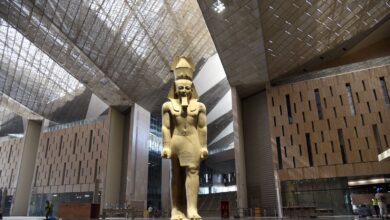Sanaa — Yemen's president has made a new offer to protesters demanding he steps down, proposing he stays in his post until elections are held but transferring his powers to a caretaker government, an opposition source said on Wednesday.
Ali Abdullah Saleh made his offer at a meeting on Tuesday night with Mohammed al-Yadoumi, head of the Islamist Islah party. It was the first time Saleh had dealt with Islah, once a partner in his government, an opposition spokesmen said.
"The opposition could pick a head of government of its own choosing and there would be parliamentary elections by the end of the year," an opposition source said of Saleh's offer.
He said the opposition was still considering its response.
Weeks of protests by thousands of Yemenis in Sanaa and other cities have brought Saleh's 32-year to the brink of collapse, but the United States and top oil producer Saudi Arabia, a key Yemen financer, are worried over who could succeed their ally.
They have long seen Saleh as a bulwark of stability who can keep Al-Qaeda from extending its foothold in a country that many see as close to disintegration.
Yemen's Al-Qaeda wing claimed responsibility for a foiled attempt in late 2009 to blow up an airliner bound for Detroit, and for US-bound cargo bombs sent in October 2010.
US officials have said openly they like working with Saleh — who has allowed unpopular US military operations in Yemen against Al-Qaeda — and Saleh has said the US ambassador is involved in talks to find a solution.
ISLAH LURES WASHINGTON
Sheikh Hamid al-Ahmar, a key tribal figure who belongs to the Islah party, told Reuters on Tuesday Islah and the opposition could handle the militant issue better than Saleh, whose government he said was not serious in confronting them.
"I think Yemenis would be capable to free Yemen of terror within months," Ahmar said, adding the United States and European countries should call directly for Saleh's departure.
"They should do what they did in Egypt. We don't need what is going on in Libya. We don't need that much support. But support like what was done in Egypt would be enough to finish things," he said.
Protesters and opposition parties suspect incidents of lax security over the past week are government ploys to demonstrate to foreign powers that Saleh is the strongman who can hold the impoverished Arabian Peninsula state together.
Islamists took control of a town in central Abyan province after government security deserted it, and the governors of the northern Saada and Jawf provinces also quit, leading "popular committees" who back the protest movement to step in.
The opposition says Saleh is to blame for the presence of militants, including Al-Qaeda, in Abyan's city of Jaar, where an explosion at a bullet factory killed 140 people on Monday.
A perennial survivor of civil wars and militancy, Saleh has said Yemen could slide into armed conflict and fragment along regional and tribal lines if he leaves office immediately.
Saleh, who has been alternately conciliatory and defiant, has vowed in public to make no more concessions to opponents.
But talks have been going on behind the scenes for days.
This week Saleh's ruling General People's Congress proposed a new government to activate Saleh's earlier offers of a new constitution ahead of early parliamentary and presidential elections. He said in February he would not run for reelection when his term expires in 2013.
The opposition says it believes Saleh is maneuvering to avoid limits on his family's future political activities and secure a guarantee they would not be prosecuted for corruption.
Some ideas that were floated included both Saleh and General Mohsen, a kinsman and former ally seen as Yemen's second most powerful man, stepping down together as well as Saleh handing over power to a new vice-president.




